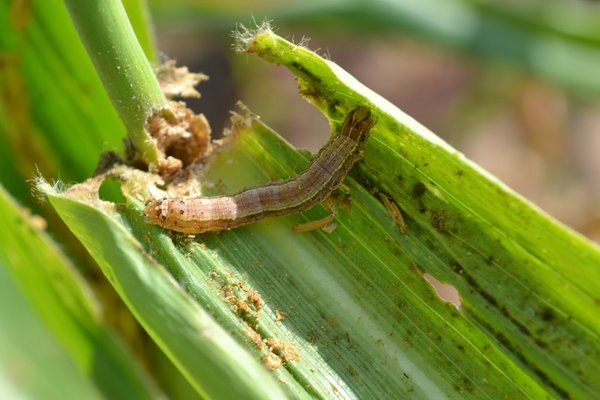 Read this article in French
Read this article in French- Share this article
- Subscribe to our newsletter
CABI study updates safer options for fall armyworm control in Africa
The new study by CABI scientists, “Updated assessment of potential biopesticide options for managing fall armyworm (Spodoptera frugiperda) in Africa”, published in February in the Journal of Applied Entomology, includes many biocontrol products which are now featured in the CABI BioProtection Portal – a free web-based tool that enables users to discover information about registered biocontrol and biopesticide products around the world.
The fall armyworm (Spodoptera frugiperda) attacks around 100 species of plant but favours maize. It has already caused substantial damage to staple crops grown by smallholder farmers in many parts of Africa.
Lead researcher Dr Melanie Bateman, together with other CABI colleagues and scientists from the International Centre of Insect Physiology and Ecology (ICIPE) in Nairobi/Kenya, and Lancaster University/UK, reveal that the revised list of biopesticide active ingredients (AI) – which have been registered in one or more of the 30 study countries for fall armyworm management – now stands at 41.
The current paper builds on the first assessment (Bateman et al, 2018) by profiling four additional AI. These are Aspergillus oryzae, Autographa californica multiple nucleopolyhedrovirus (AcMNPV), Spodoptera littoralis nucleopolyhedrovirus (SpliNPV) and thyme oil.
“Many smallholder farmers continue to resort to pesticides to tackle the fall armyworm but we believe that safe, sustainable and effective interventions such as biopesticides should be a key element of Integrated Pest Management plans,” Bateman said. “This is particularly important when you consider that many farmers are using highly hazardous pesticides without personal protective equipment and the use of broad-spectrum pesticides can negatively impact natural enemies to help manage fall armyworm.”
The CABI scientists add that since the first assessment, field trials demonstrating the efficacy have been carried out for eight active ingredients (A. oryzae, azadirachtin, B. thuringiensis subsp. aizawai, maltodextrin, FAW sex pheromones, spinosad, Spodoptera frugiperda multiple nucleopolyhedrovirus and Spodoptera littoralis nucleopolyhedrovirus), which has led to products being registered across some countries in Africa.
Number of biopesticide active ingredients registered per country has doubled
“The findings of this update are encouraging. In the relatively short time since the last assessment, the number of biopesticide active ingredients registered per country that could potentially be used to manage fall armyworm has more than doubled, and there have been similar increases in the numbers of products registered,” said Dr Steve Edgington, co-author of the paper and responsible for product data on the CABI BioProtection Portal. “But of course, at the farm gate, knowledge is still needed of what products are actually available and how to use them correctly.”
The researcher recommends that farmers and extension workers keep up to date with the latest biopesticide products available in their region to fight the fall armyworm, and a range of other pests for that matter, by using tools such as the CABI BioProtection Portal.
The researchers added that further studies could include looking at establishing the most cost-effective method of use for many active ingredients to fight the fall armyworm.
(CABI/wi)
Full paper reference:
Bateman ML, Day RK, Rwomushana I, et al. Updated assessment of potential biopesticide options for managing fall armyworm (Spodoptera frugiperda) in Africa.
J Appl Entomol. 2021;00:1–10. https://doi.org/10.1111/jen.12856
For more information:
First study published in 2018:
Assessment of potential biopesticide options for managing fall armyworm (Spodoptera frugiperda) in Africa
See also CABI website, article on fall armyworm





Add a comment
Be the First to Comment